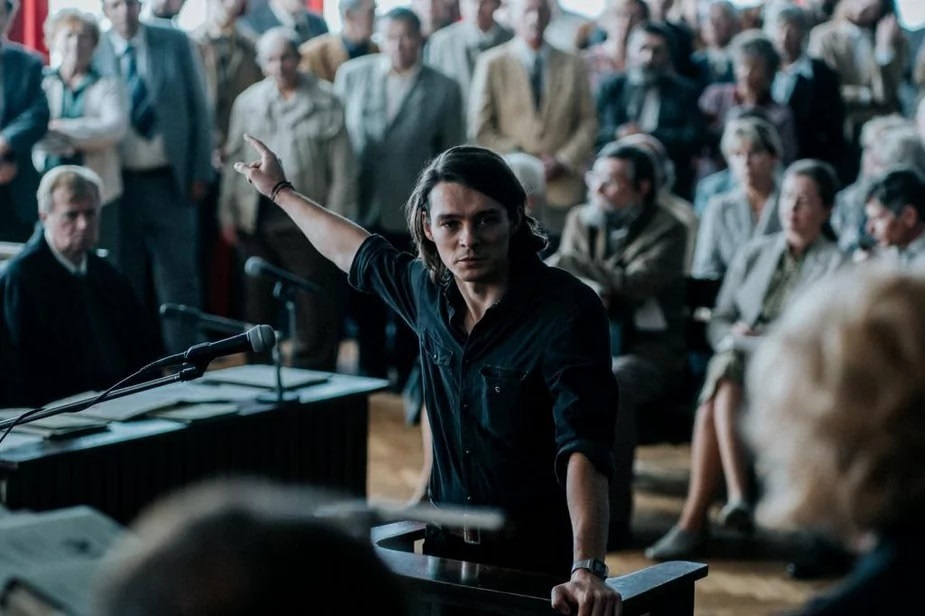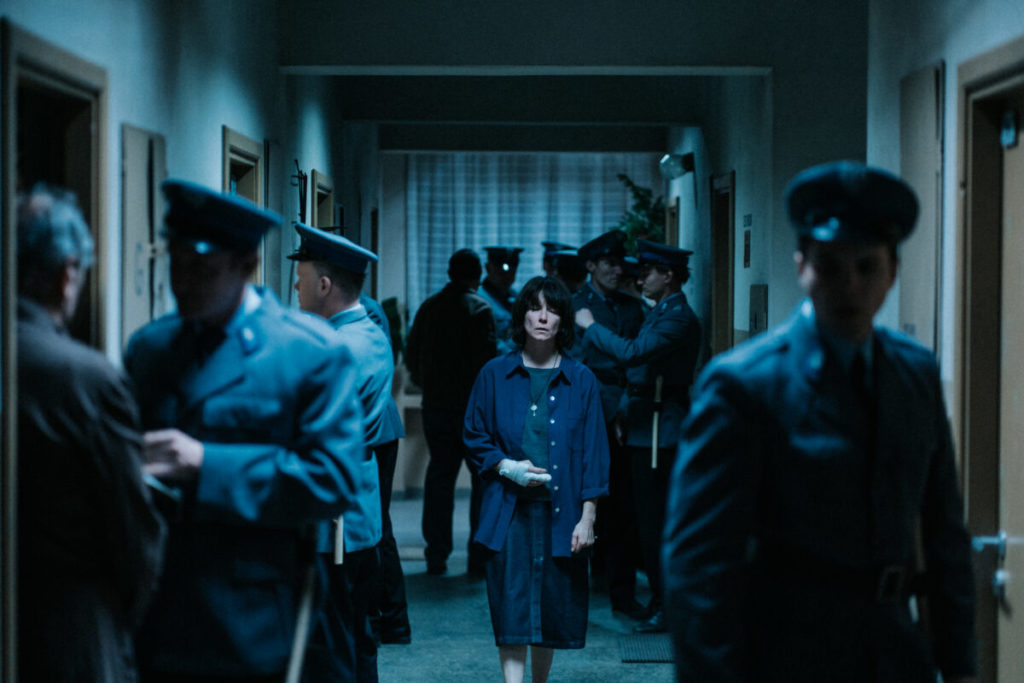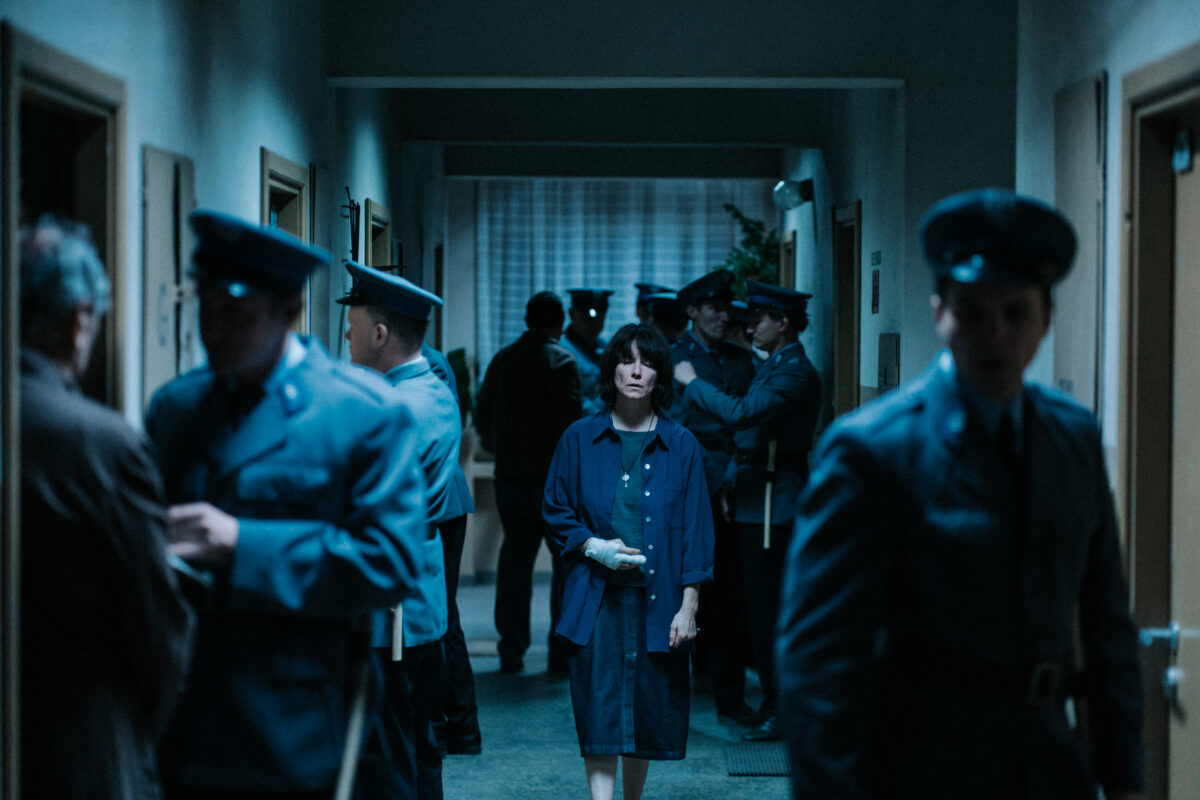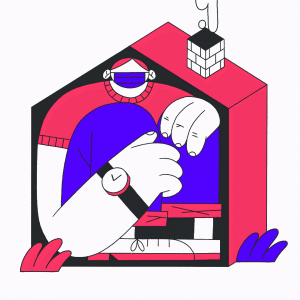Jan Matuszynski is a Polish film director (Deep Love, The Last Family). In this interview, we discuss his latest feature film Leave No Traces (2021) which was based on the real story of Grzegorz Przemyk, an eighteen-year-old who died after he was beaten by the Polish militia in 1983, and the government cover-up that followed. Leave No Traces was the opening film of the 29th IFF Febiofest Bratislava 2022. This interview was conducted during the festival.

KZ: The film was partly based on the book by Cezary Lazarewicz. What was the first impulse that got you thinking about making this film? An impulse that might have come from the book but not necessarily..
JM: I think the first impulse was my producer Aneta Cebula-Hickinbotham saying: „There is this book and you should read it. You’re gonna love it.” I knew what it was about. It turned out it’s a great story that should be filmed. It’s a must-have film and if no one made it before, I wanted to do it – it was that simple. The rights for the book were available. This was the practical part of my decision to make this film. The emotional part, which is more important, is that when I first started reading the book I got scared of how familiar I am with the situation even though it happened almost 40 years ago. That’s why I always say that this film came out of fear and I had this feeling during the whole production.
KZ: I like the idea of battling fear with filmmaking.
Well, you know I’m a filmmaker – that’s the only thing I can do. I can do a film about what scares me and what I think is important. I think this story is still very important because we can take a lot out of what happened then. It was also quite a challenge in terms of checking my directorial skills – it’s a massive wide-range epic story to be told on a big screen.
And probably there are a ton of other reasons why I wanted to do that. When I was reading the book, I already saw some of the scenes – for example, the one where Wysocki, the guy from the ambulance, is testifying. His testimony is very far from what really happened. I thought I would like to see this scene – I think that this scene is important – I can’t live without the scene. So it became crucial, very early on, that this film had to happen.
KZ: I think every country, certainly every post-Soviet country, has a story like this. It’s something that’s embedded in us. So I’d like to know how this film was received in Poland and whether you’re satisfied with the reception – not merely with the rewards it received but the audience experience in general. It’s a very sensitive subject – was there any pressure in this regard?
JM: On one side I was hoping for a better number in terms of audience but because of the covid and the pandemic situation, we all got squeezed in between other titles. Because there are other films waiting to be released, it wasn’t the huge audience that I wanted. But it doesn’t matter because I think that this film will have a long life on VOD. People are going to remember this film and will return to it.
One of the greatest moments for me was in Warsaw during one of the first screenings. People were coming with their teenage kids, and it wasn’t just one or two cases. I realized that parents are bringing their children to see this story. They treat it differently but they all take a lot out of the film.
I heard a lot of great comments from the older generation, who’d say they remembered the situation the way it was shown on the big screen. I heard a lot of great comments from teenagers or young people in general – they were shocked by what they saw. For them it was believable and they got intrigued by the story if you can say that about a story like this. They finally saw how it was, what those people went through, so they got really attached and involved. As a director, if you hear comments like this you can only be happy.
This film is tough, it’s not the easiest one, it’s not really a first date kind of film. But it works and people are passing this film to their friends and so on…
KZ: I was impressed by the performance of Sandra Korzeniak (playing Barbara Sadowska, the mother of the murdered Grzegorz Przemyk). She moved as if she really was broken, I think I’ve seen people move like this before in real life. What was the most challenging aspect of working with actors and actresses?
JM: The character Sandra Korzeniak is playing is not an obvious character in terms of how people grieve. She’s not really crying out loud about her loss. She’s a character who is always at least two scenes ahead with her emotions. She’s not crying hysterically when she gets the information that her son died – she’s grieving when she hears from Grzegorz (Mateusz Górski) what happened at the police station. I really like this scene because it’s focused on her face and you get all of those pure emotions pouring out. After that, she’s moving into a different stage of grief, where she’s trying to be as active as she can be, and later on it all breaks down.
The number of characters here was a huge challenge in terms of constructing the narrative and the storytelling. It’s kind of a character-driven story about Jurek (Tomasz Zietek) but not really. He’s more of a protagonist you just follow around – he’s the witness so he’s the metaphor of the viewer, the audience. But his character also has his arc which is quite strong. From his perspective, it’s a coming-of-age story because it’s about him learning that he should take responsibility for his actions and that he can be capable of taking decisions by himself which is not that obvious at the beginning. This arc is quite contemporary because I think that it’s one of the huge problems of young people nowadays that they have a lot of opportunities but they don’t feel sure or secure about going here and there. It’s not that clear anymore.
There are so many characters in the film because we wanted to make a film about the system. All the antagonists are a part of the structure that’s fully orchestrated from the lowest to the highest position.

KZ: I like that the antagonists weren’t just one clear-cut consistent body. I think it was remarkable that the antagonists were often just dangerously stupid or ignorant – it wasn’t a biblical type of evil.
JM: It was quite a revelation for me when I read the book for the first time to find out that not everyone in power at that time was pure evil like Dr Evil in Austin Powers or something. Everyone had their own agenda, including the prosecutors and the politicians.
I was actually fascinated by the fact that Czeslaw Kiszczak (Robert Wieckiewicz), the minister of internal affairs, who was such a bad guy and did tons of bad things, wasn’t responsible, at least not directly responsible, for the beating. He had to cover up something that he didn’t actually do. This is very interesting in terms of dramaturgy and narration.
One of the things that I really like about making films is that you can actually dig through the whole story and show a lot of different perspectives. Each time you find out that it’s not what you thought at the first glance. For example, in the relationship between Jurek and Barbara Sadowska – you’re halfway through the film and then you realize that it’s totally different than you thought.
It makes you think outside of the box which is one of the wonderful advantages of cinema – you can’t do that with any other form of art, except for literature.
KZ: Both of your future films are actually dealing with a similar time period in the history of Poland. Is there something you find fascinating about that time or is it just a coincidence?
JM: Mainly, it’s a coincidence. But I think there are a lot of stories that need to be told. That’s why Leave No Traces is probably not my last time in that era. In a way, it’s easier to go back and set up a story in the 80s for example because it’s a closed period. Or it looks like it’s closed but now when you look around, it seems to be coming back.
KZ: Or it has never left.
JM: Yeah, I can see in Poland, or Hungary, or here, in all of the Post-Soviet countries, that it is somewhere in our backbone. I was in Moscow eight years ago during the Moscow Film Festival, which used to be an A grade film festival, by the way. I had this strange feeling that something is very wrong there because there are two different types of people: those who didn’t escape mentally out of the communist regime, and then there is this bunch of young people who think that Russia is in Europe. That’s not really true either, because it’s probably somewhere between those two positions. It’s really hard to understand that if you’re not living there. And you don’t want to live there – especially now. There is this huge burden somewhere in our DNA, the ghosts of the past, and we won’t flush them out. Probably that’s why stories like Leave No Traces feel kind of familiar, unfortunately. I would love to say that it’s a historical drama that happened ages ago.
KZ: Since the story behind the film carries so much trauma, do you remember if there were any moments during the filming when it really weighed on you, or your team?
JM: I’m trying to be a craftsman who’s doing his job right. I don’t want to get too personal. It’s not like the film is my life – it’s just a job. It’s a tough, extraordinary job, and I love it, but it’s still just a job. I learned not to get too attached during one particular project years ago. I really thought that it was going to be my first feature film. The producer told me that we had the rights to the book, so we started to write the treatment and I spent three months with the screenwriter working on that. I thought it was going to be huge, I could feel every word, every inch, and then it turned out that we didn’t have the rights to the book. It was really a tragedy and a huge lesson. I learned that you can’t go too personal with the project – you have to care about it, you have to fight for it, but it’s not like your life depends on this one. Practically, it means that you need to have a bunch of projects.
I’m trying to stay professional. But of course, while filming on set, there’s like tons of jokes – the heavier the topic the more laughter we’re actually having because we have to live with that. I remember talking to real Wysocki about the suicidal attempts and that was very difficult for me emotionally. I had to ask a guy about what kind of rope he used to hang himself. This is a very sensitive matter, but on the other hand, only while preparing a film, you can ask that kind of question. One of my first jobs was a crappy documentary for TV, and I had to interview a guy who murdered two people. I remember that we were sitting just like we’re sitting right now, and I asked him why he did it. And he said that he doesn’t know why.
It sounds kind of silly and flat, but it was very deep because I knew his background circumstances. And I thought then, that making films is mainly about meeting people in extraordinary circumstances. You meet the crew, actors, characters, consultants, and people at festivals because that’s what this film generates: it generates new conversations. Some of them are repetitive, not very fresh, like some of the interviews of course. As a human being, I learned a lot. I’m still curious and I hope it stays that way.
KZ: What are you currently working on?
JM: I’m working on a project which is finally a contemporary one, so it’s not a historical drama. I can’t say anything more except that if The Last Family is a family film and Leave No Traces is a coming-of-age film, the third one would be some sort of romantic comedy. We’re hoping to shoot it possibly this year, but you never know what’s gonna happen tomorrow, or tonight.
KZ: I have one more question – it’s a little silly. There was a detail in the film that really stood out to me. In one of the scenes, Jurek is running into a phone booth in a city housing estate. And next to the booth stands a cow – it’s very casual. What’s up with the cow?
JM: Well, I thought it’s important because nowadays, especially in Poland, there are cities growing but we kind of forgot that there are cows, pigs. There was this huge mall in Warsaw called Galeria Mokotów, and somebody found a picture of a cow standing on the grass in this exact location in the mid-70s. I wanted to put that in this film because there are still places in Poland where you have this connection between blocks of flats and the field. I have to say that I get a lot of very nice comments from directors about this cow.
KZ: It reminds me of photographs of a Bratislava district called Ružinov from the 60s. There are horse carriages with freshly built blocks of flats in the background.
JM: You know, the older I get the more important it is for me to actually understand where we came from, what formed us, why we are here like this, why we aren’t like, say, French people. When you dig through this part of historical culture, there’s a huge difference. In Poland, we still have a problem with great buildings built during the 60s and 70s because they were built in the communist era, so we don’t like them. But in terms of architecture there’s this attitude that if you like them, you like communism. There’s a lot of work to do and this cow is just a tiny bit.
KZ: We’re pretending that it didn’t happen so we sort of erase history instead of incorporating it.
JM: I would call it historical ignorance in a way because we care about how hard it was for our nation during the Second World War and after that and so on, and yes, that’s all true, but we should finally learn that we are somewhere between Western Europe and Russia. We have to continue choosing to go this way, or that way. Nowadays it became quite clear – I hope.

